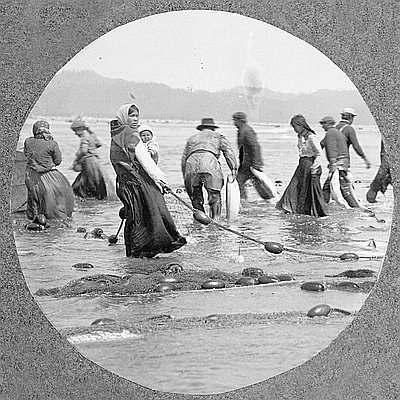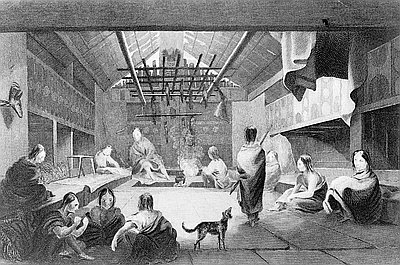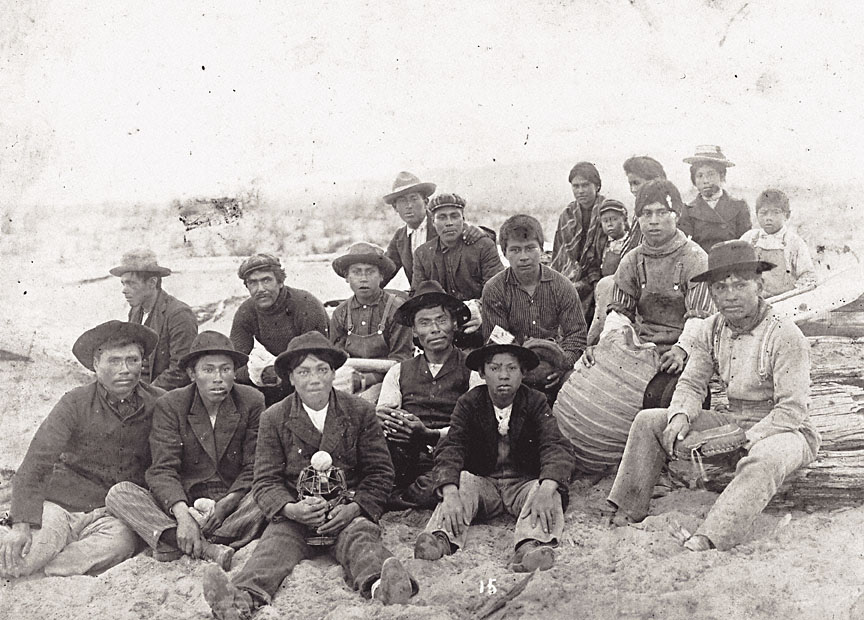- Catalog No. —
- OrHi 77026
- Date —
- circa 1907
- Era —
- 1881-1920 (Industrialization and Progressive Reform)
- Themes —
- Environment and Natural Resources, Labor, Native Americans, Trade, Business, Industry, and the Economy
- Credits —
- Oregon Historical Society
- Regions —
- Coast Columbia River
- Author —
- Unknown
Chief George Charley's Seining Crew
This photograph shows Chief George Allen Charley (center in vest and white shirt) and his seining crew in Pacific County, Washington, around 1907. Chief Charley was chief of the Shoalwater Bay Indian Tribe, a mixed group of Lower Chehalis and Shoalwater Chinook. During the first decades of the twentieth century Chief Charley led seining crews to the lower Columbia River every summer to fish for salmon. Most of his crew were probably Chinook Indians, in whose traditional territory the most productive seining beaches were located.
Pacific County resident Harland Plumb had fond recollections of Chief Charley and his seining crew, with whom he spent the summer of 1920. Plumb’s father had made a deal with Chief Charley to seine along the beaches of Peacock Spit and Sand Island, two of the most productive seining grounds on the Columbia River. “The right to fish on the seining grounds of Peacock Spit and Sand Island,” Plumb later wrote, “belonged entirely to the Indians. My father and the other whites shared in the catch only because they furnished the gear and part of the labor. But Chief Charley and his tribal members owned the fishing rights; there was no question about that in 1920, or for all the years before.”
By the mid-1920s, however, white fishermen were challenging Chinook seining rights. In 1925 the U.S. Army ordered the Chinook to vacate Peacock Spit, though the Chinook were able to arrange a temporary agreement allowing them to stay. In 1928 Chief Charley’s seining crew was driven off Peacock Spit by white fishermen who had leased the grounds from the state of Washington. The seining crew returned to the spit in July 1929 but were again driven off. They then turned to Sand Island, a highly productive seining ground located in Baker Bay, but they were driven off by employees of the Barbey Packing Company. A few days later an Oregon fish warden seized the crew’s gear and arrested one of their leaders, ending the battle over the seining grounds that season.
The U.S. district attorney sued one of the local salmon canneries in an attempt to affirm Indian fishing rights in the lower Columbia River, but the case was poorly presented and the court ruled against the plaintiffs. The Chinook Indian Tribe continues their effort to reestablish their aboriginal right to fish in the lower Columbia.
Further Reading:
Beckham, Stephen. Chinook Indian Tribe: Petition for Federal Acknowledgment. Lake Oswego, Oreg., 1987.
Tetlow, Roger T., and Graham J. Barbey. Barbey: The Story of a Pioneer Columbia River Salmon Packer. Portland, Oreg., 1990.
Plumb, Har. “A Happy Summer on Peacock Spit.” The Sou’wester 13 (1978): 26-59.
Written by Cain Allen, © Oregon Historical Society, 2006
Related Historical Records
-
Chinook Indians Seining
This photograph was taken by John F. Ford, a photographer who had commercial studios in Portland and Ilwaco, Washington, between approximately 1900 and 1914. It shows a group …

-
Chinookans of the Lower Columbia River
This engraving by Richard W. Dodson was based on a sketch by Alfred T. Agate. Agate’s drawings, along with those of several other artists and scientists, illustrated Charles …

